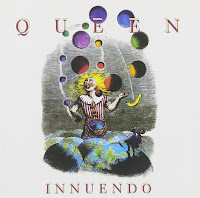It has always been so: college textbooks are frighteningly expensive. During my undergraduate, the annual investment of textbooks was the most fluid and generally stressful financial aspect of starting a semester. With several hundred dollars on the line, it did not seem like tacking on another $20 or so to indulge in some new music was such a big deal - at least not to the irresponsible twentysomething that I was. There were a couple of albums that I snuck into my collection under the umbrella of my textbook budget, one of which was Tin Machine II. Another was Queen’s Innuendo, an album that I have been thinking a lot about in the past few weeks.
In 1991, Queen held the same position for me that I described in my previous post about David Bowie. I grew up with them featured prominently on the radio, but the only album I had by them was the Flash Gordon Soundtrack, which was an odd entry in their catalog. I also owned a greatest hits CD and had every intention of eventually expanding their presence in my collection.
It took me almost two decades to realize this latter ambition, by the way. As of this writing, the only Queen studio album missing from my collection is The Miracle, which I did have at one point. That, however, is another story.
Queen had a progressive aspect that kept them on my radar, so when I read that Steve Howe had a guest appearance on Innuendo, it became the first proper Queen album in my adult CD collection. Before its release, it seemed that Queen’s music had suffered from some inconsistency due the commercial expectations of their success. Certainly, Radio Ga Ga had its sights on the masses and did not compare to the cinematic scope of Bohemian Rhapsody, at least in my mind. The symphonic horizons of Innuendo suggested that Queen was making an earnest attempt to recapture the adventurous artistry that informed their best work. I enjoyed it a lot.
What I did not know when I bought Innuendo, however, was that Freddie Mercury was sick. He had been fighting a very private battle with AIDS for several years by that point, but publicly denied that his health was deteriorating. Mercury finally announced his condition late in 1991, and passed away virtually the next day. With this news, Innuendo suddenly and dramatically changed for me. Within the context of Mercury’s mortality, the album’s earnestness and good humor seemed more like urgency and poise.
Queen was an album band, so although their songs could be taken individually, the programming always seemed to enhance the album's overall narrative. The placement of the melodramatic The Show Must Go On as the closing track on Innuendo was an undeniably clear statement. After the announcement came, I remember sitting in my dorm room getting choked up with several friends imagining the once vibrant Mercury sitting on a stool for support and belting out the vocals for this track in spite of his own fading strength.
Within the context of Mercury’s imminent demise, it suddenly became apparent that the impetus for this album was not merely an effort to recapture past glories. Even taking Mercury’s condition into account, the value of Innuendo did not lie in the fact that it was the last time he would record with Queen before he passed. Rather, it was because that album was about his impending death and a document on the manner in which he chose to approach it. Mercury's death was the innuendo that ran throughout the album, too subtle to notice on the surface, but impossible to ignore once it came to light.
Bowie’s recent passing brought this situation to mind. The brave and subtle way in which Innuendo brought Mercury’s struggles to light was so revealing about his character and his art has inspired me to seek the same in Bowie's recent posthumous release, Blackstar. Certainly, I don't expect it to sound the same as Innuendo. There are few artists who are willing to put that kind of struggle up for public scrutiny, however, and I think it would be a shame to overlook such a personal epitaph.

No comments:
Post a Comment